 Crypto for health care?
Crypto for health care?
With help from Derek Robertson
Modern healthcare has a problem: There are a lot of diseases needing better treatment, but the drug industry doesn’t always have a financial incentive to develop a new drug, or even to test an old one on a new ailment.
A company called Love Health has a very 2022-sounding solution: launch a DAO to fund and test experimental treatments.
On the surface, it makes a lot of sense: A DAO, or decentralized autonomous organization, is basically a blockchain crowdfunding mechanism where the funders also get to vote on what the group does.In this case, the “voters” are very likely to be patients and families frustrated with a lack of progress on their disease, and willing to put their support behind new ideas the industry won’t pursue.
Using a DAO to connect pharmaceutical companies and patients is gaining interest.Another company, Vibe Bio, is using a DAO to give patients with rare disease more of a say in treatment research.
Underneath the surface, however… The project combines one of the most tightly regulated industries in the world, health care, with a crypto-driven structure invented partly to avoid regulation.
What could possibly go wrong?
Love Health is cofounded by Ryan Breslow, an entrepreneur known for positioning himself as an outsider battling elite venture capitalists (all the while accruing an $11 billion valuation for his first company, Bolt).
In August, Love Health announced a $7.8 million raise.The money largely came from investors with little expertise in health care, but the company already has some industry talent aboard: Its chief medical officer, Kevin Horgan, has an impressive resume with leadership roles in immunology and oncology at AstraZeneca, Johnson & Johnson, GE, and Merck.The company initially hired a head of regulatory affairs, Stacy McIntosh, who has a background working for biotech and pharmaceutical companies, but then pivoted away from conducting clinical trials itself, so she’s now in a more advisory role.
Love itself isn’t a DAO; it’s a corporation.But it’s helping create the DAO and plans to be a member that will vote on the treatments the group wants to validate and provide funding for.Love says it will work with established companies to coordinate clinical trials.The DAO would have its own token, which would ostensibly accrue and deliver value back to investors—though Breslow said there’s no promise of upside.
The company is planning to launch a community with a marketplace for nutraceuticals, supplements and services that promote wellbeing.
Once launched, the goal is to use community brainpower to come up with potential research subjects.Love Health may also use the results of the trials to help bring health products to the market, which could then be sold to its community.
The appeal of Love for organized groups of patients who already feel boxed out by mainstream medicine is pretty obvious.
The company has launched a social channel on Discord to get crypto enthusiasts interested in the project.
It does have a warning for for people interested in throwing money into the DAO:
“Anybody getting involved in this should know that this is a very experimental undertaking,” said Breslow.“Any money that they put into it, they should be prepared to lose.”
He’s not new to financial technology.Breslow’s earlier company, Bolt, developed online checkout technology.After a Twitter tirade in January, Breslow stepped down as CEO of the company.Since then, the company has been sued by its biggest customer and laid off employees.The New York Times also reported Bolt misled investors about its technology and scale.
Despite Bolt’s reputation, Horgan said he’s impressed with Breslow.
In Love Health, he sees an opportunity to get outside the constraints of making one drug for one indication.Some lesser understood conditions, like chronic fatigue, he said, may require a combination of treatments.
“What’s needed is an enterprise that frames the question differently,” he told POLITICO.There are plenty of generic drugs with well-understood safety profiles and effects, he pointed out, and diseases they haven’t yet been tested on.“The question is, have they been exploited to their potential maximally? And the answer to that is definitely not.”
For example, researchers have observed that metformin, a generic drug for diabetes, might reduce mortality among tuberculosis patients.
To prove this drug might help patients would require a clinical trial.The median cost of an FDA pivotal clinical trial was $19 million, according to a 2018 study.Pharmaceutical companies have no incentive to pay for that trial, because they no longer own the intellectual property.So often, these observations remain anecdotal only.
Governments and nonprofits sometimes step in to pay for these clinical studies.
In the case of metformin, the government of India is working with a nonprofit called the Open Pharma Foundation to run trials.Horgan sees Love Health’s DAO as another possible source.
Who exactly will invest in the tokens? Breslow told POLITICO that he wants people who care to be involved, but “it’s impossible to avoid speculators becoming a part of this as well.” In a sense, it’s like a charity funding drug trials, with some intriguing potential for upside.
Love Health expects to launch its DAO in December.What will regulators think? Love will have to register its token with FinCEN and comply with anti-money laundering provisions.But there are lots of open legal questions about the DAO.
A legal fellow at the Heritage Foundation recently suggested that members of a DAO could be personally responsible for its liabilities (some are becoming LLCs or creating offshore corporate structures avoid that).
And there is a larger question of ethics here—whether Love is encouraging people to chase faint hopes, or whether individuals should be footing the bill for science that a company might profit from.That’s a question far beyond a new structure to solve.
state of the metaverse
It’s been a rough few months for the tech giants driving the development of the “metaverse,” the eponymous Meta not least among them.
So where does that leave the overall project? Benedict Evans, a newsletter writer and tech and business analyst with 20 years of experience in the industry, has some answers in a recent blog post titled “Ways to think about a metaverse.” The main takeaway: Yes, the concept of a “metaverse” might be frustratingly amorphous at the moment.But much like with technologies like the mobile internet, no one is quite sure which elements of metaverse development will endure, or who the industry “winners” will be, so it’s worth sticking around and engaging.
“A lot of people in tech and telecoms thought mobile Internet would be big, but almost no-one realised that everyone would use it, nor that this would become the new central paradigm of consumer tech and replace PCs,” Evans writes.“You needed to see both parts to realise what would happen — that the tech would get better, and what that would change.”
We have no idea what that will look like for VR and AR technology yet — which is exactly why so many big companies and tech watchdogs even aside from drivers like Meta are watching the field like a hawk.— Derek Robertson
crypto’s soon-to-be-shepherd
What’s next for crypto policy after the midterms?
POLITICO’s Sam Sutton has a report today for Pro subscribers, as Republicans’ takeover of the House is all but imminent — homing in on Rep.Patrick McHenry (R-N.C.), who will likely lead the House Financial Services Committee next year and therefore find himself at the center of hot-button debates over how to regulate regular crypto, stablecoins, and more.
Sam writes that “McHenry’s embrace of financial startups over the years has made him a favorite of venture capitalists and crypto exchange executives, who have backed the 17-year incumbent with campaign contributions and public support,” and notes that crypto-friendly VC heavyweight Andreessen Horowitz just hired one of his top aides to lead its crypto policy shop.
What that warm-and-fuzzy approach might look like in practice: New rules for stablecoins, easier regulations for digital-first banking platforms, and in general a storm of wonky policy action around crypto — “If anyone knows how to operate,” Blockchain Association Executive Director Kristin Smith told Sam, “It’s him.” — Derek Robertson
the future in 5 links
– Sony has unveiled its new VR headset, available in February.
– Check out the futuristic-looking new airplane models that could green the skies.
– Crypto’s slump has killed a slew of high-profile ETFs in Australia.
– Google has unveiled its AI-powered writing tool meant to spark creativity.
– Binance’s CEO said that when it comes to CBDCs, “the more we have the better.”.
